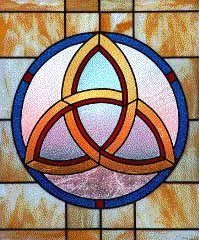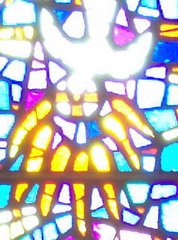Polycarp (70-155/160). Bishop of Smyrna. Disciple of John the Apostle.
"O Lord God almighty...I bless you and glorify you through the eternal and heavenly high priest Jesus Christ, your beloved Son, through whom be glory to you, with Him and the Holy Spirit, both now and forever" (n. 14, ed. Funk; PG 5.1040).
Justin Martyr (100-165). He was a Christian apologist and martyr.
"For, in the name of God, the Father and Lord of the universe, and of our Savior Jesus Christ, and of the Holy Spirit, they then receive the washing with water" (First Apol., LXI).
Ignatius of Antioch (died 98/117). Bishop of Antioch. He wrote in defense of Christianity.
"In Christ Jesus our Lord, by whom and with whom be glory and power to the Father with the Holy Spirit for ever" (n. 7; PG 5.988). "We have also as a Physician the Lord our God Jesus the Christ the only-begotten Son and Word, before time began, but who afterwards became also man, of Mary the virgin. For ‘the Word was made flesh.' Being incorporeal, He was in the body; being impassible, He was in a passable body; being immortal, He was in a mortal body; being life, He became subject to corruption, that He might free our souls from death and corruption, and heal them, and might restore them to health, when they were diseased with ungodliness and wicked lusts." (Alexander Roberts and James Donaldson, eds., The ante-Nicene Fathers, Grand Rapids: Eerdmans, 1975 rpt., Vol. 1, p. 52, Ephesians 7.)
Irenaeus (115-190). As a boy he listened to Polycarp, disciple of John. Became Bishop of Lyons. "The Church, though dispersed throughout the whole world, even to the ends of the earth, has received from the apostles and their disciples this faith: ...one God, the Father Almighty, Maker of heaven, and earth, and the sea, and all things that are in them; and in one Christ Jesus, the Son of God, who became incarnate for our salvation; and in the Holy Spirit, who proclaimed through the prophets the dispensations of God, and the advents, and the birth from a virgin, and the passion, and the resurrection from the dead, and the ascension into heaven in the flesh of the beloved Christ Jesus, our Lord, and His manifestation from heaven in the glory of the Father ‘to gather all things in one,' and to raise up anew all flesh of the whole human race, in order that to Christ Jesus, our Lord, and God, and Savior, and King, according to the will of the invisible Father, ‘every knee should bow, of things in heaven, and things in earth, and things under the earth, and that every tongue should confess; to him, and that He should execute just judgment towards all...'" (Against Heresies X.l)
Tertullian (160-215). African apologist and theologian. Wrote in defense of Christianity.
"We define that there are two, the Father and the Son, and three with the Holy Spirit, and this number is made by the pattern of salvation...[which] brings about unity in trinity, interrelating the three, the Father, the Son, and the Holy Spirit. They are three, not in dignity, but in degree, not in substance but in form, not in power but in kind. They are of one substance and power, because there is one God from whom these degrees, forms and kinds devolve in the name of Father, Son and Holy Spirit." (Adv. Prax. 23; PL 2.156-7).
Origen (185-254). Alexandrian theologian. Defended Christianity and wrote much about Christianity. "If anyone would say that the Word of God or the Wisdom of God had a beginning, let him beware lest he direct his impiety rather against the unbegotten Father, since he denies that he was always Father, and that he has always begotten the Word, and that he always had wisdom in all previous times or ages or whatever can be imagined in priority...There can be no more ancient title of almighty God than that of Father, and it is through the Son that he is Father" (De Princ. 1.2.; PG 11.132). "For if [the Holy Spirit were not eternally as He is, and had received knowledge at some time and then became the Holy Spirit] this were the case, the Holy Spirit would never be reckoned in the unity of the Trinity, i.e., along with the unchangeable Father and His Son, unless He had always been the Holy Spirit." (Alexander Roberts and James Donaldson, eds., The Ante-Nicene Fathers, Grand Rapids: Eerdmans, 1975 rpt., Vol. 4, p. 253, de Principiis, 1.111.4) "Moreover, nothing in the Trinity can be called greater or less, since the fountain of divinity alone contains all things by His word and reason, and by the Spirit of His mouth sanctifies all things which are worthy of sanctification..." (Roberts and Donaldson, Ante-Nicene Fathers, Vol. 4, p. 255, de Principii., I. iii. 7).
Definition
perichoresis: circuition, going around, or more precisely envelopment -- being drawn into the circulation of divine love and participating in the coinherence of the Divine Persons.
John 17:20-23.26: "I pray not only for them, but also for those who will believe in me through their word, so that they may all be one, as you, Father, are in me and I in you, that they also may be in us, that the world may believe that you sent me. And I have given them the glory you gave me, so that they may be one, as we are one, I in them and you in me, that they may be brought to perfection as one, that the world may know that you sent me, and that you loved them even as you loved me... that the love with which you loved me may be in them and I in them."

St. Alexander of Alexandria
"They hanged upon a tree Him Who stretches out the earth; they transfixed Him with nails Who laid firm the foundation of the world; they circumscribed Him Who circumscribed the heavens; they bound Him Who frees sinners."
Blog Archive
-
▼
2007
(16)
-
▼
June
(16)
- Martin Luther
- Considering Richard of St. Victor
- Augustine's "On The Trinity"
- John Calvin from "The Institutes of the Christian ...
- The Self-Giving Triune God, The Imago Dei And The ...
- The Living Breath of God
- Jonathan Edwards
- The Divine Dance - Exploring the Mystery of the Tr...
- Triune God Chart
- Claims of Jesus
- Jesus in the Old Testament
- The Names of God
- Early Trinitarian Quotes
- Dante's Final Vision
- Preliminary Articles
- Idols of the Mind
-
▼
June
(16)
Devotional Reading

